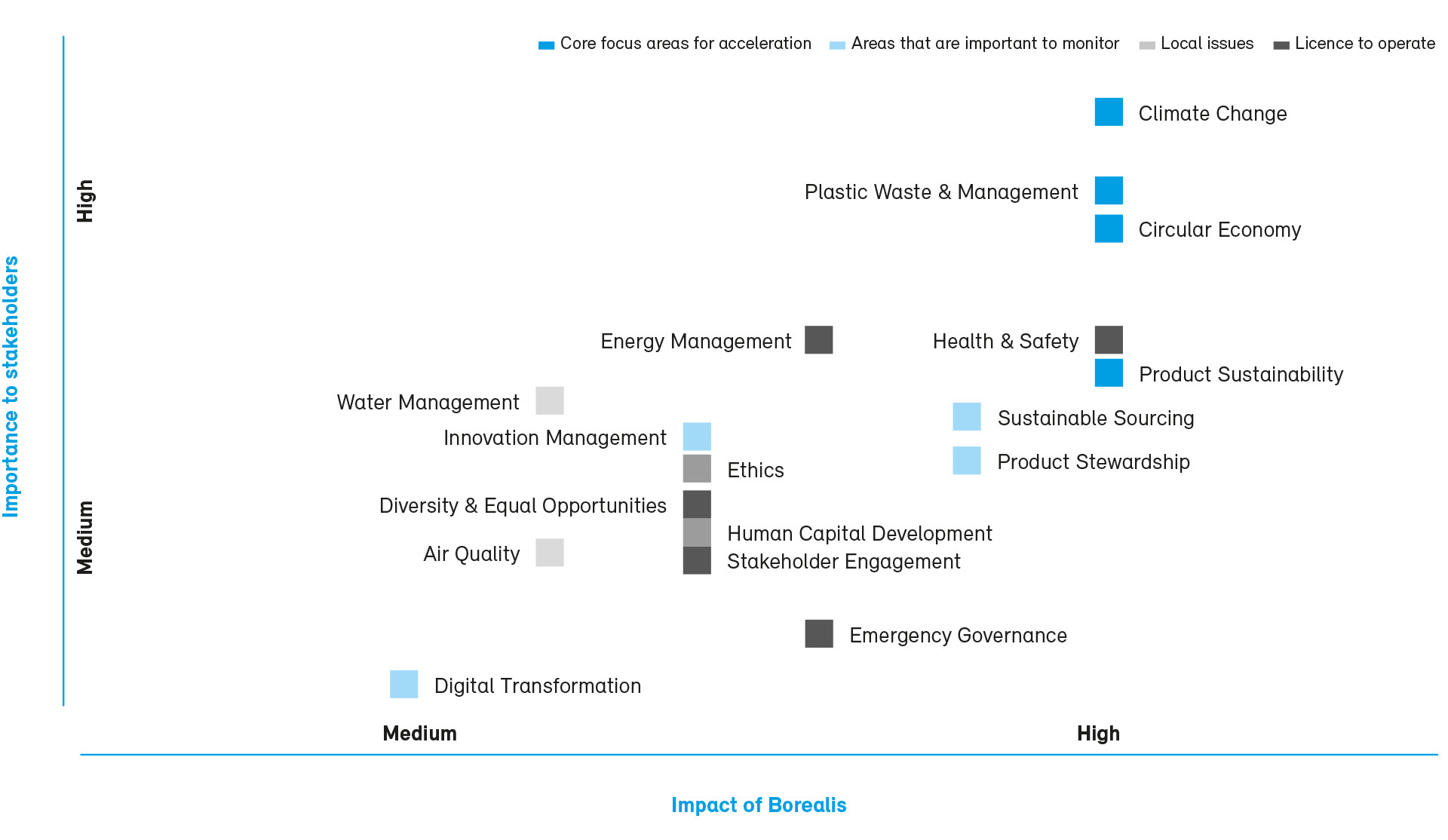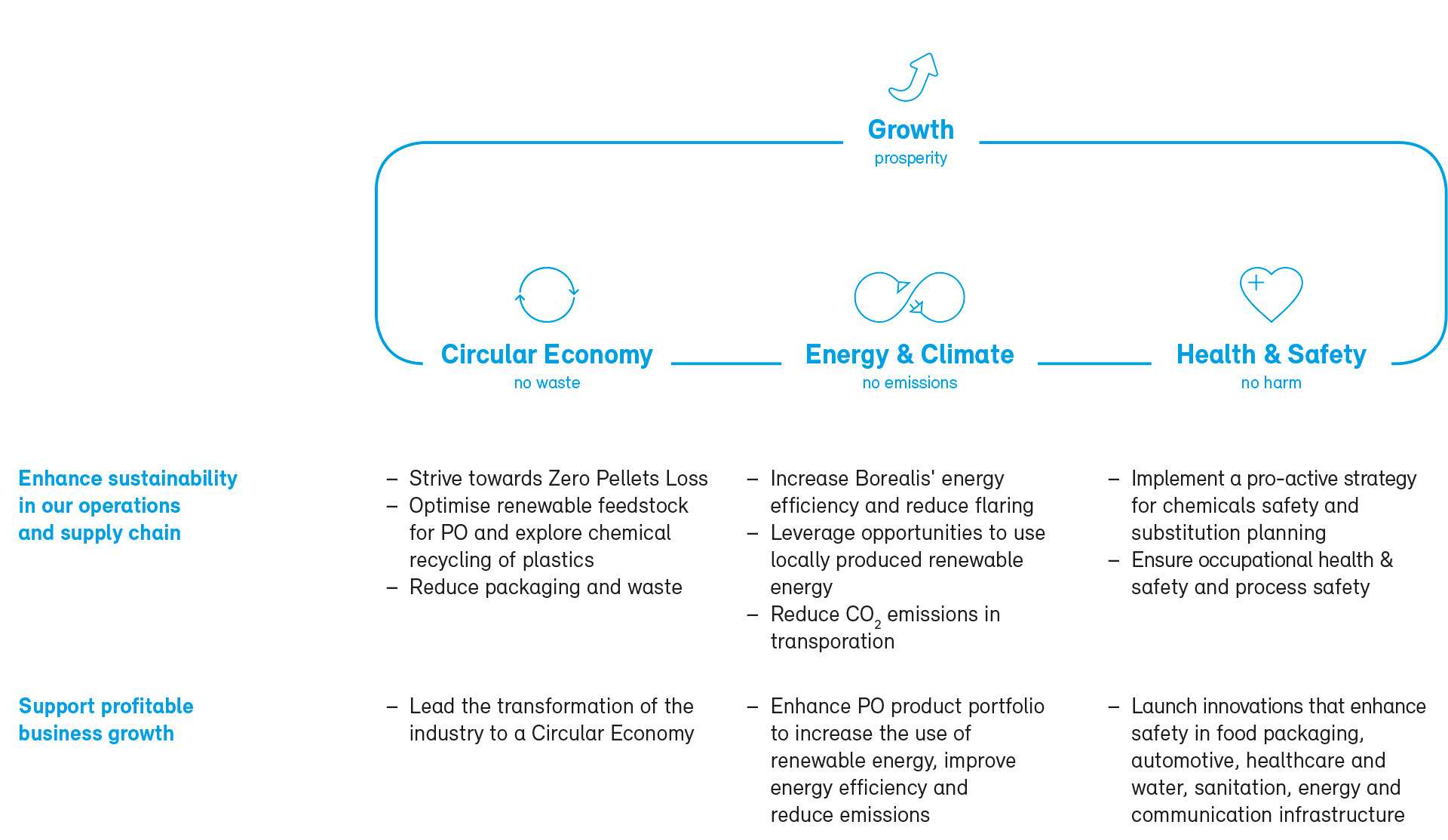Borealis' Strategic Sustainability Framework

To foster true sustainability throughout its business, Borealis takes responsible and fact-based decisions, balancing their contribution to the so-called 3Ps: People, Planet and Profit. Improving its sustainability performance will enable the Group to make a sustainable difference to the progress of society, while also being more efficient, reducing costs and mitigating long-term business risks.
Embedding sustainability in the business is therefore a key success factor for Borealis and a priority for the Executive Board. The Sustainability Advisory Team (SAT), comprising of senior management from key functions across the organisation, meets bi-monthly to assess and guide sustainability projects and activities, prior to gaining approval from the Executive Board when necessary. In 2019, nine sustainability flagship projects were executed, as major contributors to Borealis’ sustainability journey.
As part of embedding sustainability capabilities in the business, Borealis engages senior and mid-level managers from across the organisation in a bespoke Business Sustainability course, led by the IMD Business School. Since 2016, 72 managers have been successfully certified, including 16 in 2019. Through this course, Borealis supports continuous learning across the organisation to enhance and deepen their understanding of important sustainability issues and projects including the circular economy, materiality identification, marine littering, micro plastics and design for recycling. Interactive webcasts on current and emerging sustainability issues are held with a network of employees throughout the year, providing an effective tool for embedding sustainability in the functions.
During the year, Borealis continued to increase awareness of sustainability issues across the Group. It enhanced its Sustainability Access Point, a portal on the Group intranet, providing employees with direct access to information on sustainability topics and Borealis’ position on current and emerging issues.
In order to shape the Sustainability Strategy and contribute to the Group Strategy review, in 2019 Borealis carried out a Stakeholder Sustainability Materiality Assessment to identify current and evolving stakeholder concerns and priorities, thereby updating its 2013 assessment.
The assessment confirmed that Borealis’ sustainability strategic framework remains relevant and that the Group is on the right path. Borealis’ focus on the Circular Economy and Climate Change are as relevant today as they were before and the Group will further strengthen its efforts in these areas. As stated in the Sustainability Strategy, Health & Safety considers both operational aspects and product sustainability aspects, which likewise remain of utmost importance. A new Sustainability Strategic Framework has been developed based on the Sustainability Materiality Assessment and will be launched in January 2020.
In 2019, the Executive Board decided that a sustainability key performance indicator would be added to its Group Performance Scorecard from 2020, reinforcing the importance of sustainability performance to the successful development and growth of the organisation.

The Sustainability Materiality Assessment carried out in 2019 assessed 17 aspects, according to their importance to Borealis’ stakeholders and their impact on the Group, society and the environment. The process was supported by an external consultancy.
The first step was to identify the stakeholder groups relevant to Borealis, which included customers, brand owners, suppliers, academics, non-governmental organisations, investors, representatives of local communities, regulatory authorities and the media. Next, desk research used big data algorithms to identify the most highlighted sustainability aspects related to the industry. An initial assessment was then performed of the relative importance of these aspects to the Group’s stakeholders. The next step was internal engagement with a variety of functions and levels within Borealis. They indicated the importance of the highlighted aspects to their own function, in an iterative fashion.
In addition, Borealis’ impact on society and the environment was analysed, given those same highlighted aspects. Through this process, Borealis determined the material aspects for its business.
As a result of the assessment, Borealis developed a Sustainability Materiality Matrix, based on four levels of response:

The following four topics were identified as the most important to Borealis and its stakeholders and are defined as “Core focus areas for acceleration”.
In addition to the four core focus areas for acceleration, four topics have been designated as “monitor elements”. Those are important sustainability topics for Borealis, which the Group must monitor and continuously improve:
Air quality and water management were identified as local issues which require attention at an operational level, in conjunction with local authorities, laws and regulations.
In addition, the following topics are categorised under “License to operate” and are integrated into Borealis’ corporate culture and processes:
In 2019, the SAT focused on a list of nine initiatives called the Sustainability Flagship Projects. These are initiatives that affect the whole Group and had clear milestones for 2019. This provides visibility for Borealis’ top management of real and winning sustainability initiatives. With that approach, the business units integrate sustainability into their own strategies.
The Sustainability Flagship highlights of the year were:
Going forward, a thorough review of the Sustainability Flagship Projects will be carried out at each year end. Incomplete and new Flagship Projects will be identified and their progress monitored, with reviews by the SAT.
In 2018, Borealis established a method to do portfolio sustainability assessments, which we called the Portfolio Sustainability Compass, to identify how the Group’s product portfolio contributes to a sustainable society. Borealis based its approach on the WBCSD chemical industry methodology for portfolio sustainability assessments.
In 2019, the Group extended the Portfolio Sustainability Compass from 10% of its products to 80%. Products are grouped into three segments, based on clearly identified sustainability criteria.
In addition to assessing the existing portfolio, the assessment tool is used to differentiate the innovation pipeline and new projects with high sustainability factors. The Portfolio Sustainability Compass is therefore a key instrument in developing solutions that deliver sustainable benefits to society.
In 2014, Borealis voluntarily began annual assessments according to the systematic Ecovadis Standard, as it is one of the most accepted standards to assess sustainability of a company. In 2019, Borealis was awarded its third consecutive Gold Status for its Ecovadis Scorecard, placing the Group in the top 1% of all industry peers who participated during the year.
Borealis is part of the Together for Sustainability initiative, which aims to improve the sustainability standards of the supply chain of chemical companies. Moreover, Borealis’ Code of Business Conduct for Suppliers prohibits discrimination and requires suppliers to apply appropriate work hours and wages for their employees. It also states that no forced and compulsory labour, no harassment and abuse of labour, and no child labour should exist in our vendors’ activities.
In 2019, Borealis made significant strides in its sustainability journey. In 2020, it will continue to reinforce its commitment to supporting the sustainable development of the Group and the industry. In addition to the ongoing initiatives that enhance our focus on sustainability, Borealis will notably: